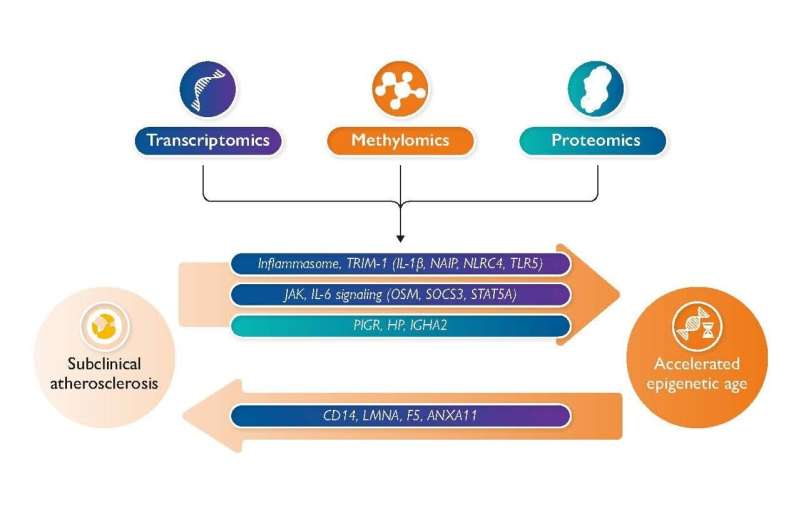This article has been reviewed according to Science X's editorial process and policies. Editors have highlighted the following attributes while ensuring the content's credibility:
fact-checked
peer-reviewed publication
proofread
Study shows strong association between atherosclerosis and accelerated aging

Atherosclerosis—the much-feared 'hardening' of our arteries—impacts our health long before the appearance of symptomatic cardiovascular disease. A new study by a team at the Centro Nacional de Investigaciones Cardiovasculares Carlos III (CNIC) demonstrates a strong association between atherosclerosis at subclinical stages and an accelerated aging process.
The study is published in the European Heart Journal. Lead author and CNIC General Director Dr. Valentín Fuster emphasized that the results underline the benefits of reducing inflammation by adopting a healthy lifestyle (healthy diet, regular physical activity, etc.) or taking specific medication, such as cholesterol-lowering statins "that can block, or at least slow, the transition from the subclinical phase of atherosclerosis to the appearance of severe cerebrovascular events, like myocardial infarction or stroke."
The study shows that there is a strong association between the presence, extent, and progression of atherosclerosis at the subclinical level and accelerated epigenetic aging in otherwise healthy young individuals, said Dr. Enrique Lara Pezzi, an author on the study.
Epigenetic age is a measure of a person's biological age (the functional age of their cells and tissues) based on the idea of the epigenetic clock. Epigenetic clocks use machine learning algorithms to predict a person's biological age and life expectancy based on their level of DNA methylation, explained study first author Fátima Sánchez Cabo.
But sometimes, said Sánchez Cabo, this prediction does not correspond to a person's chronological age (the time elapsed since birth), "so that someone's epigenetic age can be older than their chronological age, whereas someone else might have an epigenetic age younger than their chronological age."
Fortunately, unlike the germinal mutations we carry in our genome, "changes in DNA methylation are reversible, opening up the possibility of 'slowing down' our epigenetic aging," assured Lara Pezzi.
The identification of an association between subclinical atherosclerosis and reduced life expectancy based on epigenetic clocks was possible thanks to a massive analysis of data from the PESA-CNIC-SANTANDER study, which is led Dr. Valentín Fuster. Since 2010, the PESA-CNIC-SANTANDER study has analyzed the progression of subclinical atherosclerosis in more than 4000 Banco Santander employees aged 40 to 54 years at the start of the study and with no prior history of cardiovascular disease.
"The follow-up of this cohort constitutes one of the most important cardiovascular prevention studies in the world," said Dr. Fuster.
The European Heart Journal study combines data on the progression of atherosclerosis obtained with advanced imaging techniques with detailed information on participants' lifestyle and data from molecular omics studies.
"These molecular data allowed us to advance our knowledge of the causal mechanisms of subclinical atherosclerosis, as well as its clinical consequences, providing key information for a more personalized treatment of the disease in its early stages," said Lara Pezzi.
Using transcriptomic and proteomic data, the study demonstrates that systemic inflammation triggered in individuals with a high burden of atherosclerotic plaques may be a key factor in accelerating their epigenetic aging.
The authors conclude that the study identifies a solid association between the presence, extent, and progression of subclinical atherosclerosis and accelerated epigenetic aging, mediated in part by low-grade chronic inflammation induced by inflammatory cytokines.
The authors nevertheless recognize that further longitudinal studies are needed over a longer follow-up period and supported by more experimental data, in order to provide a more thorough characterization of the effect of atherosclerosis on health and life expectancy and to identify underlying mechanisms.
More information: Fátima Sánchez-Cabo et al, Subclinical atherosclerosis and accelerated epigenetic age mediated by inflammation: a multi-omics study, European Heart Journal (2023). DOI: 10.1093/eurheartj/ehad361





















